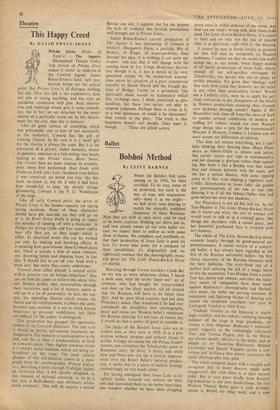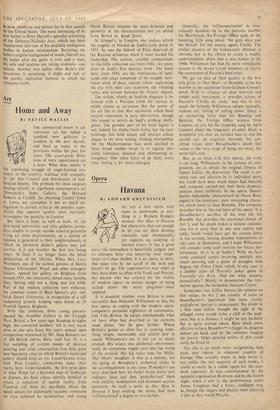Ballet
Bolshoi Method
By CLIVE BARNES
WHEN the Bolshoi first came among us in 1956, we were ravished. To be sure, some of us protested, but such is the way of rape, and unquestion- ably—deny it as we might— we had never seen dancing to match the absurdly confident eloquence of these Russians. Now they are with us once more, and we tend to be more cautious. Holding our skirts just so, and now primly aware of our own ballet vir- tues, we expect them to seduce us with some show of finesse. We complain, and justifiably so, that their production of Swan Lake is poor (in fact, it's worse that poor; for a company of these possibilities, it's disgraceful) and we righteously murmur that the choreography, music and decor •for The Little Hump-Racked Horse are pberile.
Hurrying through Covent Garden's Crush Bar on my way to more salubrious climes, I heard a sleek man, with the tetchy 'show me!' air of someone who had bought his status-symbol seat dear on the black market, tell all around that the Russians will have to do better than this! And he, poor blind creature, had just seen Plisetskays dance. One wondered if he had ever considercd the possibility that choreography, decor and music are Western ballet's substitutes for Russian dancing. It's not true, of course, but it would do him a power of good to consider it.
The faults of the Bolshoi Swan Lake are as evident now as they were in 1956. It is a pro- duction without purpose and without focus; it nCither lovingly re-creates the old Petipa/Ivanov version, nor revitalises the Tchaikovsky score or Romantic story. In short, it bores, and while here and there one can see a tactical improve- ment over the Royal Ballet's tattered produc- tion, it seems that as a piece of balletic strategy undeservingly we win hands down.
Yet having consigned their Swan Lake to its rightful limbo, lectured our visitors on their sins and instructed them to do better next time, one wonders whether we have been chopping down trees in wilful defiance of the wood. Any fool can see what's wrong with their Swan Lake (and The Little Hump-Backed Horse, if it comes to that) and we may run the risk of missing what is so gloriously right with it—the dancing.
It cannot be easy in Soviet society to produce art that will also be acceptable to Western audiences. I cannot see that we could ever really', accept the, to our minds, banal happy ending of all Soviet productions of Swan Lake, where, instead of the self-sacrifice envisaged bY Tchaikovsky, the heroes' win out to attain an earthly paradise. Yet given their ideology (and they are), how could they honestly see the ballet in any other than materialistic terms? Would not a Catholic critic, were he to apply his per- sonal conviction to art, disapprove of the lovers in Western productions attaining their triumph over darkness through suicide? Again, if Mr. Macmillan took time off from the cares of State to wander around exhibitions of modern art sniffing for ordure, would not even Western stage design take a turn for the conventional? Moscow is Moscow, London is London and we must accept our differences of opinion.
This does not excuse everything, but I can't help thinking their dancing does. Maya Pliset- skaya as Odette/Odile is remote and heioic. She sternly rejects any sops to sentimentality, and her dancing is glorious rather than appeal- ing. Her body is like a flexible wire that makes lean and sinuous patterns with the music and she has a unique fluency, with arms rippling away as if they were shaping a signature tune. Coldly idiosyncratic in Swan Lake, she pushes any preconceptions of the role to one side, dancing it as if all the Odette/Odiles who had gone before her were but shadows, Yet Plisetskaya is not all fire and ice. As the Tsar-Maiden in The Little Hump-Racked Horse she is warm and witty, the sort of woman you would want to talk to at a cocktail party. She shrugs her shoulders with a casual grace, and her beautiful greyhound face is crinkled with wry humour.
The whole of The Little Hump-Backed Horse succeeds largely through its good-natured un- pretentiousness. A recent version of a century- old ballet, it has always been regarded as the first of the Russian nationalist ballets—the first classic encounter of the Russian Innocent with the fairy ballerina. The story-book tale of a perfect fool enlisting the aid of a magic horse to win the mysterious Tsar-Maiden from a comic Tsar has charm and interest, and after the statu- tory snorts of indignation have been made against Radunsky's choreography and Shelled- rin's music, the ballet has purring moments of enjoyment and lightning flashes of dancing you cannot see surpassed anywhere—not even in Leningrad, London or New York.
Vladimir Vasiliev ' as the Innocent is touch- ingly truthful, and his radiant, sweeping dancing bounces off the stage in huge parabolas, yet retains a lithe elegance. Radunsky's bulbously comic vulgarity as the endearingly villainous Tsar, and Tatiana Popko, cute as the Horse, are almost equally effective in the ballet, and an adagio act for Ekaterina Maximova, Mikhail Lavrovsky and Shamil Yagudin carries a con- viction and brilliance that almost transmute the tinsel choreography into gold.
The whole company dance with a breadth and arrogance that in lesser dancers could seem exaggerated, but with them it is their natural order. But to turn away briefly from Russia's big battalions to our own shock-troops, the tiny Western Theatre Ballet gave a sixth birthday season in Bristol the other week, and is now
in peak condition and poised for its first assault on the United States. The most interesting of its new ballets is Peter Darrell's splendid reworking Of the Debussy/Nijinsky !eta, which has been transformed into one of his stealthily ambiguous studies in human relationships. Retaining the ballet's original background of tennis, Darrell sets the ballet after the game is over and a man, his wife and mistress are taking cocktails—and Poison. Another new ballet, Alan Beale's Ob- servations, is promising, if slight and full of the quirky, individual humour in which the company excels.



































 Previous page
Previous page